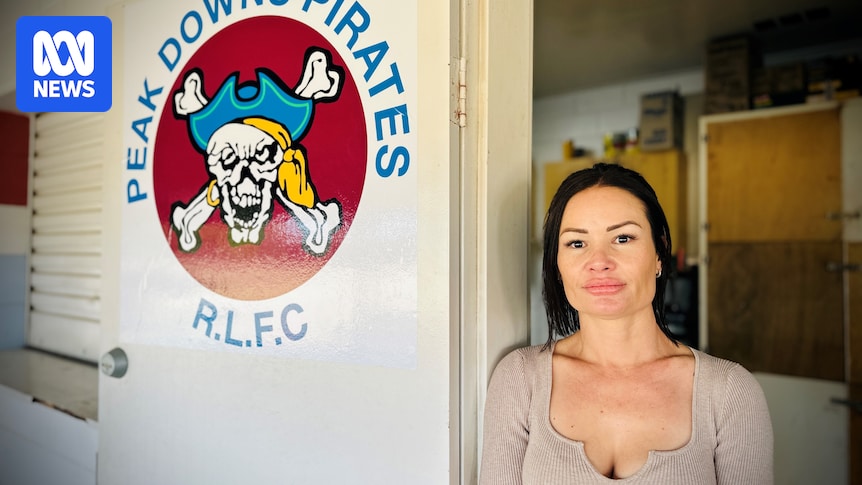
It’s a Saturday afternoon in Tieri, a small mining town in central Queensland, and the local footy field at Langerak Park should be bustling with activity. The Peak Downs Pirates Rugby League Club, a cornerstone of this 700-person community, would typically draw fans eager to secure a spot by the bar, ready to cheer with camp chairs in tow. But today, the field stands empty.
“I’ve cried and I’m looking at grown men with tears in their eyes,” said Samantha Reinke, a long-serving committee member of the Pirates, as she gazed over the deserted field from the clubhouse. The absence of a game is a stark reminder of the club’s recent dissolution, a casualty of economic shifts and changing work patterns in the area.
Challenges of Economic Shifts and FIFO Work
The town of Tieri, established in 1983 as a service hub for local coal mines, now faces a dwindling population and the closure of two out of its three mines. The remaining Glencore-owned Oaky Creek North Coal Mine employs about 800 workers, but half of them are fly-in fly-out (FIFO), contributing to the town’s shrinking numbers and the decline of its sporting clubs.
“Everybody looked forward to a home game,” Reinke reflected. “That’s all gone now, and there’s nothing else to do. It’s very demoralizing for the community to lose something like this.”
“As the years have gone by, and you see it with all the mining communities, especially the small ones like ours, it’s almost impossible to get a full side,” said Reinke.
The Broader Impact on Community Sports
Once a hive of sporting activity, Tieri’s clubs for touch football, hockey, soccer, gymnastics, indoor cricket, tennis, and lawn bowls have all but disappeared. The Pirates are the latest to fold, despite having over 50 registered players this season. Injuries and shift work made it challenging to field a full team, leading to the club’s heartbreaking decision to cease operations.
Club president Mitch Reinke and coach Ben Liddell expressed their devastation over the decision. “The town’s got a real thirst for rugby league, and to have to pull the pin was a really hard decision,” Liddell said.
Ripple Effects Across the Region
The story of Tieri is echoed in nearby towns like Capella, where the race club and bowls club have shut down, and the tennis club struggles to survive. Cathy Murray of the Capella Tennis Club noted a significant drop in participation since the COVID-19 pandemic, despite efforts to introduce new activities like pickleball to revive interest.
Andrew Jansen, a karate instructor in the Central Highlands, has witnessed similar declines. “The bigger hours people are working, quite often we’ll get a phone call to say, ‘We can’t make it, I’m at work still,'” he explained.
“We’ve lost our grocery store, we’ve lost our only doctor, it’s a dying town really,” said Murray.
Expert Insights and Future Prospects
According to Dean Miller, a senior lecturer in psychology at CQUniversity, the decline of sports clubs in rural areas reflects broader social and economic pressures. “The engagement in community and getting more people into sports out there can really help the morale and engagement with social circles,” Miller emphasized, highlighting the mental and physical health benefits of sports participation.
As communities grapple with these challenges, figures like Samantha Reinke are advocating for greater support from larger organizations. “My goal is to create awareness and perhaps get the NRL [National Rugby League] involved more in helping out the smaller communities,” she said.
“It would be good to have some sort of incentive for players to come out here and play because it would just boost the town’s morale,” Reinke added.
The demise of the Peak Downs Pirates is a poignant reminder of the shifting dynamics in Queensland’s mining towns. As these communities face the dual challenges of economic change and population decline, the future of local sports—and the social cohesion they foster—hangs in the balance.







